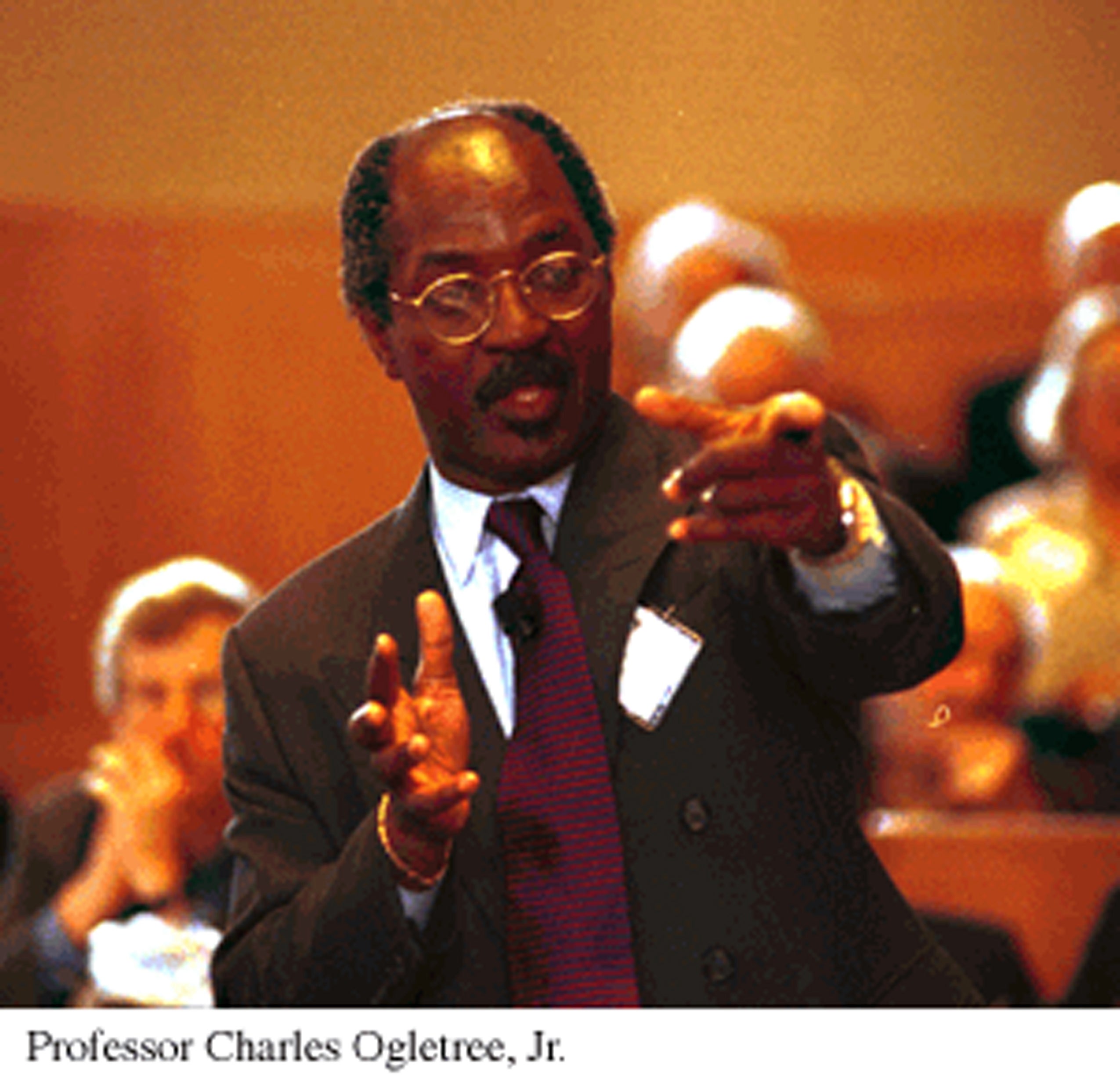A panel that included many former members of the Harvard Defenders marked the 50th anniversary of the group by examining the widely misunderstood role of the defender in the courtroom and in society. Moderated by HLS Professor Charles Ogletree, Jr. ’78, the symposium, titled “Ethics in the Trenches: The Gap Between Cultural Perceptions and the Practice of Law,” scrutinized journalists’ presentation and the public’s grasp of complex legal matters.
“We have to learn that people will misunderstand us because they don’t understand what we do,” said Sam Dash ’50, first chairman of the Harvard Defenders and chief counsel of the Senate Watergate hearings. He added that he has experienced press coverage that distorted his work. “You are in the office doing what you’re doing and [the media presents] a fiction. It has nothing to do with what goes on in the office. Nevertheless, it becomes reality.”
George Freeman ’75, assistant general counsel of the New York Times Company, said that the public’s knowledge of the criminal justice system would increase if more trials were broadcast on television.
“Especially as a result of O.J. [Simpson], when television in trials got a bad name, fewer and fewer trials are being televised,” he said. “The result of that is that the public is getting their information more from L.A. Law and Ally McBeal than the trials themselves.”
Most panelists disagreed, however, saying that the media would air portions of only the most sensational trials, which would misrepresent the breadth of the criminal justice system.
Jack Litman ’67, a former deputy chief of the Homicide Bureau of the New York County District Attorney’s Office who is now in private practice, argued that the public will always blame defense attorneys in reaction to their fear of increasing criminal activity. “The criminal defense attorney is the lightning rod and has to face the slings and arrows of the public,” he said.
When Ogletree inquired about the perception that defense attorneys are too closely identified with their clients, Penelope Marshall ’81, the only panelist who is a career public defender, pleaded guilty to the charge.
“I don’t mind being an extension of my clients,” said Marshall, the attorney-in-charge of the Federal Defender Office of the District of Delaware. “I understand where my clients come from. I understand that sometimes they cross the line.”
Panelists also discussed the fact that many Harvard Defenders become prosecutors, including participants Scott Harshbarger ’68, the former Massachusetts attorney general and district attorney of Middlesex County, and G. Glenn Roque-Jackson ’92, an assistant U.S. attorney in the Western District of Texas. They pointed to the power advantage afforded prosecutors and their ability to change the system from within.
Emphasizing the continued necessity of the Harvard Defenders, other panelists called for equity in the criminal justice system. “The greatest disgrace in this country is that the motto on the Supreme Court building, ‘Equal Justice Under the Law,’ is a lie,” said Dash. “Let’s give indigent defendants the same kind of representation we give rich defendants.”
Other symposium participants were Arthur Applbaum, associate professor of public policy at Harvard’s John F. Kennedy School of Government; Robert Cordy ’74, managing partner of the Boston office of McDermott, Will & Emery; HLS Professor Alan Dershowitz; Ruth Fitch ’83, partner in the Boston firm Palmer & Dodge; Tony Fitch ’69, partner at the Washington, D.C. firm Swidler Berlin Shereff Friedman; Bishop Earl W. Jackson ’78, founder and spiritual leader of Exodus Faith Ministries; Deborah Ramirez ’81, professor at Northeastern University School of Law; John Salsberg, supervising attorney and clinical instructor of the Harvard Defenders since 1979; Judge Frank Schwelb ’58 of the District of Columbia Court of Appeals; and Professor Alan Stone, Touroff-Glueck Professor of Law and Psychiatry at Harvard University.
